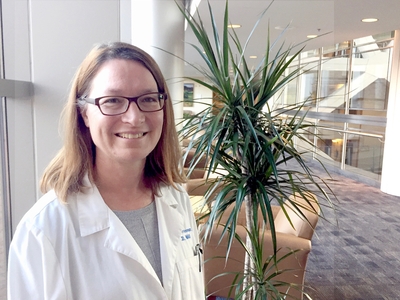
Research Topics
As a NIAID clinician, my main focus has been on the diagnosis, evaluation and management of individuals with defined and undefined primary immunodeficiencies (PIDs) with a particular focus on those with hyper IgE syndromes. STAT3 mutated Hyper IgE syndrome (STAT3 DN; Job's syndrome) is associated with eczematous dermatitis, recurrent boils, recurrent sinopulmonary infections, and multiple connective tissues, skeletal and vascular abnormalities. This is a rare primary immune deficiency, and our center allows us to study the largest cohort in the US, and likely in the world. We currently follow more than 100 individuals with STAT3 DN and provide clinical care to many when well and during acute illnesses. Through laboratory collaborations over the years, we have sought to understand STAT3’s role on human immunity, airway infection susceptibility and wound and vascular remodeling. Although our understanding of the pathogenesis of STAT3 has increased in recent years, there are still many unresolved questions regarding the pathogenesis of the varied features and the optimal therapies, including the role of hematopoietic stem cell transplantation and gene editing.
Biography
Dr. Alexandra Freeman is a pediatric infectious diseases physician at the National Institute of Allergy and Infectious Diseases at the National Institutes of Health who focuses on the diagnosis and management of primary immunodeficiencies. Dr. Freeman received her medical training at Georgetown University Medical School, completed her pediatric residency training at Yale New Haven Children's Hospital, and her pediatric infectious diseases fellowship at Northwestern University’s program in Chicago. She then joined NIH as an attending physician, briefly focusing on pediatric HIV and then changing her focus to primary immunodeficiency. Her primary focus is Hyper IgE syndromes, and she has been involved in the initial genetic diagnosis of multiple of these syndromes and is recognized worldwide as an expert in the management of these patients due to her large cohorts of patients followed at NIAID. She also directs the primary immunodeficiency clinic at NIAID in which she educates the allergy/immunology fellows in the diagnosis and management of individuals with complex primary immunodeficiencies. Dr. Freeman has over 200 peer-reviewed journal articles, multiple book chapters and reviews, and has been a speaker in many national and international conferences on the topic of primary immunodeficiencies.
Selected Publications
- James AE, West L, Schloss K, Nataraj P, Urban A, Hirsch A, Krausz M, Kumar S, Raasch J, Risma K, Church JA, Grimbacher B, Bergerson JRE, Chong H, Freeman AF. Treatment of STAT3-deficient hyper-immunoglobulin E syndrome with monoclonal antibodies targeting allergic inflammation. J Allergy Clin Immunol Pract. 2022;10(5):1367-1370.e1.
- Parisi X, Bergerson J, Urban A, Darnell D, Stratton P, Freeman AF. Obstetric and Gynecological Care in Patients with STAT3-Deficient Hyper IgE Syndrome. J Clin Immunol. 2020;40(7):1048-1050.
- Olbrich P, Freeman AF. STAT1 and STAT3 gain of function: clinically heterogenous immune regulatory disorders. Curr Opin Allergy Clin Immunol. 2024;24(6):440-447.
- Desai JV, Urban A, Swaim DZ, Colton B, Kibathi LW, Ferrè EMN, Stratton P, Merideth MA, Hunsberger S, Matkovits T, Mannino R, Holland SM, Tramont E, Lionakis MS, Freeman AF. Efficacy of Cochleated Amphotericin B in Mouse and Human Mucocutaneous Candidiasis. Antimicrob Agents Chemother. 2022;66(7):e0030822.
Related Scientific Focus Areas


Microbiology and Infectious Diseases
View additional Principal Investigators in Microbiology and Infectious Diseases

This page was last updated on Tuesday, November 25, 2025